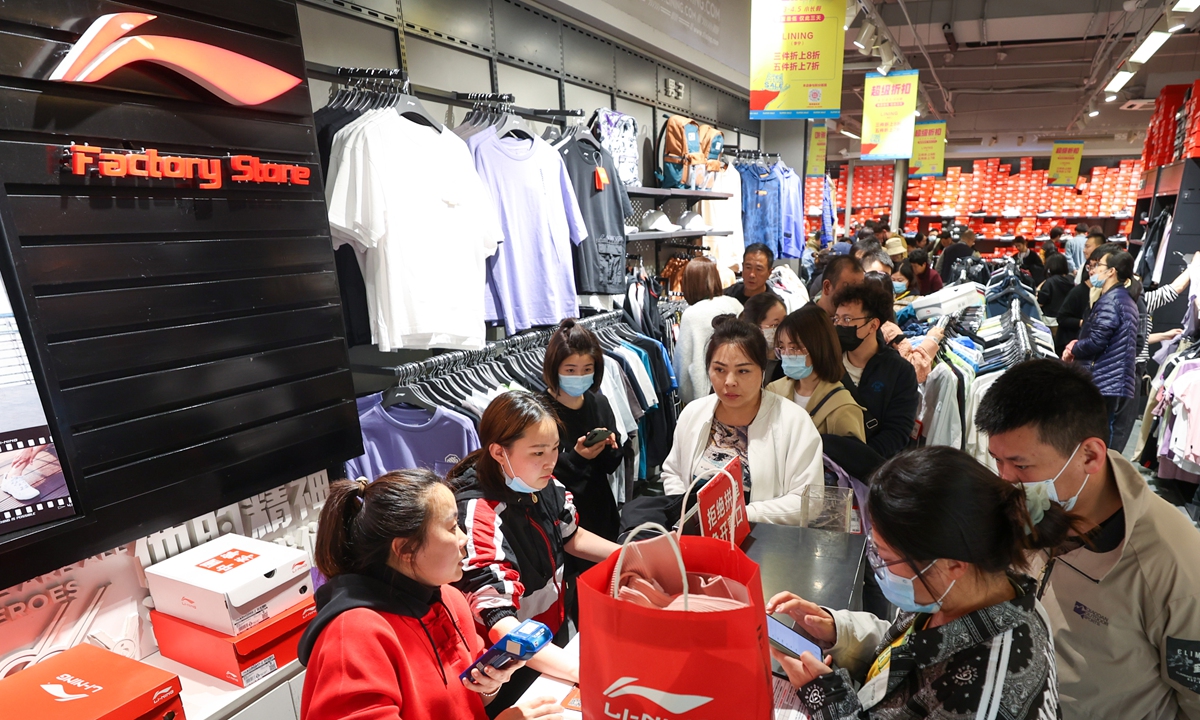
Consumers are buying sports products in a Li-Ning store on April 2 in North China's Shanxi Province. Photo: cnsphoto
From food, household appliances to vehicles, a majority of Chinese consumers believe that many Western brands could be replaced by Chinese ones, a Global Times survey showed, reflecting the rising confidence in national brands, industry analysts said.
The survey, conducted by the Global Times Research Center from April 9-12, collected 1,281 responses from 107 cities in China including Beijing, Shanghai, Xiamen and Shenzhen. The results showed that more than 75 percent of respondents agree that national products could fully or partially replace Western products.
Zhang Yi, CEO of iiMedia Research Institute, a mobile internet consulting agency, told the Global Times on Sunday that the survey showed the increasing confidence of Chinese consumers in domestic brands.
"The confidence stems from the outstanding production and supply chain capabilities of Chinese enterprises, which became quite prudent during the coronavirus-plagued 2020," Zhang said, adding that Chinese enterprises have caught up with and even surpassed foreign companies on those fronts in recent decades.
According to the survey, more than 60 percent of respondents believed Chinese brands could almost fully replace Western brands, including food, beverages and clothing, while more than 26 percent agreed that Western brands are partially replaceable.
More than half of respondents agreed that products including daily goods, shoes and home appliances from Western brands could be fully replaced by Chinese brands, and more than 40 percent believed Western brands are fully replaceable in the brackets of medical care and beauty products.
Automobiles and electronic products are the only two sectors where less than 40 percent of the respondents believed that domestic brands could fully replace foreign ones.
According to the survey, more than 20 percent of the respondents who had overseas living and studying experience believed that most Chinese brands in personal care and cosmetic category cannot replace Western brands.
"I believe that global consumers have begun feeling the same way toward Chinese brands and Chinese-made products as domestic consumers do," Zhang noted.
The other driver of the boom of Chinese brands among consumers is the rise of Generation Z - those who were born after 1995, according to Zhang.
"They were born and raised on the fruits of China's reform and opening-up policy, witnessing the nation's rapid process of rejuvenation, so they do not hold 'prejudice' toward domestic brands as their parents did, when national brands had not achieved much," he said.
Statistics from Chinese online shopping platform Tmall showed that on per-capita basis, when it comes to consumption of domestic products by the post-70s, post-80s, post-90s and post-00s generations, the post-90s generation ranks first with per-capita consumption of 5,307 yuan ($815).
According to the statistics provided by iiMedia Research Institute, Chinese consumers are paying surging attention to and spending more on domestic clothes brands and light industrial products since some Western politicians started to smear China's Xinjiang cotton on March 24.
During the sales promotion on Tmall in March, transaction indexes of H&M, Nike and Adidas and Uniqlo plummeted after the brands said they will refuse to buy cotton produced in Xinjiang, on allegations of "forced labor" there. And it turned out that the transaction indexes of domestic sportswear brands Anta Sports and Li-Ning jumped.




